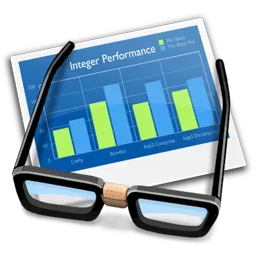Geekbench includes updated CPU workloads and new Compute workloads that model real-world tasks and applications. Geekbench is a benchmark that reflects what actual users face on their mobile devices and personal computers.
Compute Benchmark
Geekbench 6 measures your processor's single-core and multi-core power, for everything from checking your email to taking a picture to playing music, or all of it at once. Geekbench 6's CPU benchmark measures performance in new application areas including Augmented Reality and Machine Learning, so you'll know how close your system is to the cutting-edge.
GPU Compute Benchmark
Test your system's potential for gaming, image processing, or video editing with the Compute Benchmark. Test your GPU's power with support for the OpenCL, CUDA, and Metal APIs. New to Geekbench 6 is support for Vulkan, the next-generation cross-platform graphics and compute API.
Cross-Platform
Compare apples and oranges. Or Apples and Samsungs. Designed from the ground-up for cross-platform comparisons, Geekbench 6 allows you to compare system performance across devices, operating systems, and processor architectures. Geekbench 6 supports Android, iOS, macOS, Windows, and Linux.
Benchmark Charts
Verify device performance using the Geekbench Benchmark Charts. Available on the Geekbench Browser, these charts are based on data aggregated from real users in real-world environments. Whether you're considering a new purchase or are curious about a device's capabilities, use these charts to make informed decisions.
Real-World Tests
Geekbench uses practical, everyday scenarios and datasets to measure performance. Each test is based on tasks found in popular real-world apps and uses realistic data sets, ensuring that your results are relevant and applicable.
Stress Tests
Geekbench includes stress tests, which are tests that help determine the stability of your system. Stress tests help you find small problems with your system before they become big problems.
Multicore Aware
Every test in Geekbench is multi-core aware. This allows Geekbench to show you the true potential of your system. Whether you're running Geekbench on a dual-core phone or a 32-core server, Geekbench is able to measure the performance of all the cores in your system.
Cross Platform
Compare apples and oranges. Or Apples and Samsungs. Designed from the ground-up for cross-platform comparisons, Geekbench 6 allows you to compare system performance across devices, operating systems, and processor architectures. Geekbench 6 supports Android, iOS, macOS, Windows, and Linux.
64 Bit
Geekbench provides both 32-bit and 64-bit benchmarks. Find out how fast your 32-bit programs run today, and how fast your 64-bit programs will run tomorrow.
Geekbench Browser
Share your Geekbench results with other users by uploading your results to the Geekbench Browser. Let other users see how fast (or slow) your computer can go. Create an account and track all of your Geekbench results in one location.
Here's what the different numbers mean:
Battery Runtime is the battery test runtime. If the test started with the battery completely charged and ended with the battery completely discharged then the test runtime is also the battery lifetime.
Battery Score is a combination of the runtime and the work completed during the battery test. If two phones have the same runtime but different scores, then the phone with the higher score completed more work. As with Geekbench scores, higher battery scores are better.
Battery Level is the battery level at the start and the end of the test.
What's New
Primate Labs is excited to share that Geekbench 6.4 is now available for download. The latest version of Primate Labs' cross-platform benchmark features the following changes to the CPU Benchmark:
- Introduce support for RISC-V Vector Extensions. Geekbench 6.4 introduces support for RISC-V Vector Extensions, boosting the performance of workloads that leverage SIMD instructions when run on RISC-V CPUs that implement RVV.
- Improve support for Arm Scalable Matrix Extensions. Previously, Geekbench 6.3 Scalable Matrix Extensions (SME) support required CPUs to implement both SME and SME2 instructions. Geekbench 6.4 SME support now requires CPUs to either implement SME instructions or implement SME and SME2 instructions, improving compatibility and performance for upcoming CPU releases.
- Report instruction set usage. Geekbench 6.4 now reports the instruction set extensions detected and used during the CPU Benchmark (e.g., AVX2, AVX512, SME, and RVV). These reports provide insight into which instruction sets Geekbench uses during performance measurement.
- Improve CPU topology detection on Linux. Geekbench 6.4 improves CPU topology detection on Linux, in particular enhancing detection on systems with ARM and RISC-V processors.
Geekbench 6.4 scores are comparable with Geekbench 6.3 scores. Geekbench 6.4 is a recommended update for all Geekbench 6 users.

